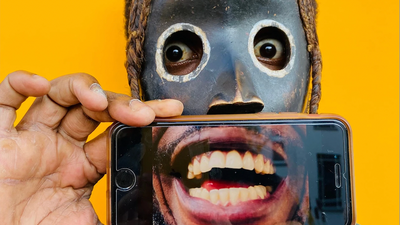Spotlight: Obou Gbais Is Painting The Story of His Life
The artist is reimagining Cote D'Ivoire's history through modern, contemporary language and his latest project "Man Dan"
In our 'Spotlight' series, we highlight the work of photographers, visual artists, multimedia artists, and more who are producing vibrant, original work.
In our latest piece, we spotlight Ivorian artist Obou GbaisAKA Peintre Obou. Obou's remarkably detailed style of painting comes after years of training and educating himself in all things Cote D'Ivoire. The artist's work mirrors the society found in the aftermath of the Ivory Coast's political-military unrest, putting paint on the harsh conditions he witnessed in capital city Abidjan. The emotive expressions donned on the Dan masked faces speak to Obou's acknowledgment of his people and the shameful conditions forced upon them due to a war that didn't involve them. As the artist puts it, "The main theme is the human condition, the characteristics, major events, and situations that make up the essence of human existence", and tapping into his ancestry allows the talent to soothe all aspects of his identity, one paint stroke at a time.
We spoke with Obou about the importance of learning from those who are where you wish to be, and finding authenticity.
Responses have been edited for length and clarity.
Describe your background as an artist and the journey you've taken to get it to where it is today.
I was born in the West of the Ivory Coast and studied in Abidjan, the capital. My ambition to become an artist started at a young age, and knew that I would pursue it in high school, and then when I went to college. I worked hard at improving myself -- and to form myself as well as my art -- and in 2012, I obtained my BA in Art. Two years later, I attended Abidjan's National School of Fine Art and from that moment, I really started to practice and educated myself in the world of art.
For five years I attended painting workshops with teachers who were also artists and who exposed me to the creation of the "perpetual". I learned a lot from them and it allowed me to open my work up to constructive criticism, which today has given me a certain openness of mind on art and the ability to continuously renew myself.
What are the central themes in your work?
My work is the story of my life -- my environment, my culture, my love stories, my traumas. My daily life. The main theme is the human condition, the characteristics, major events, and situations that make up the essence of human existence. I talk about my life, my city and also the people who live there. The element that defines me today is the Dan Mask. I have reappropriated the mask of my ancestors to create a contemporary language. In my work, I reconcile my contemporaries with their ancestral cultures by writing my story in a series of works. Generally, one sees masked crowds, one finds demoiselles of my city Abidjan. Couples and family scenes are perceived with the Dan mask and take the center of interest.
What is your medium of choice, and why?
I am sensitive to all mediums and supports but generally gravitate towards those that allow me to better transcribe the story I am telling. It's enriching for me to keep experimenting with new materials in order to be able to tell new stories. I work mostly with brushes, acrylics, and collages, but also with my hands and natural materials like earth, which give my artwork even more authenticity.
How has the pandemic affected you creatively?
The pandemic has affected my creativity in a productive and positive way. I suddenly had more time alone at home to concentrate on my work and try out new elements and methods. Many people had to limit themselves to a minimum during this time, which can be inspiring, especially for artists. Already this is a time in our lives when we were condemned to wear masks and my work is about people wearing masks. It allowed for some connections with my outside world. The series of confined people in their homes and on the streets was a testimony to the realities of that period in Abidjan.
Can you describe your artistic relationship with 'Afro-futurism' and 'surrealism'?
I consider myself as an Afro-futurist because I use, like all young people today, new technologies such as social networks to talk about my culture and share my creations with the world. Putting my country on the world stage through my work and especially my history. I would say that I consider myself a realist and not a surrealist, just by what I transcribe in my daily life -- I speak about real facts with real forms.
Can you talk about your use of colors and jewelry in your art?
The colors and jewelry are elements that appear at different times. There have been times when my work was quite dark with minimal color. And also periods when I feel a lot and peace which are symbolized in my work with quite fresh colors which give emotions.
Image courtesy of the artist
"Dan Love" 150x150 cm 2022 by Obou Gbais
▲
Image courtesy of the artist
Famille Verte 200x150 cm 2022 by Obou Gbais
▲
Image courtesy of the artist
"Liesse Dan 1" 200 x 200 cm 2022 by Obou Gbais
▲
Image courtesy of the artist
"Dan Viertel Rot" 150x150 cm 2022 by Obou Gbais
▲
Image courtesy of the artist
"Der Dan Kuss" 200x150 cm 2022 by Obou Gbais
▲
Image courtesy of the artist
"Famille Bleu" 150x150 cm 2022 by Obou Gbais
▲
